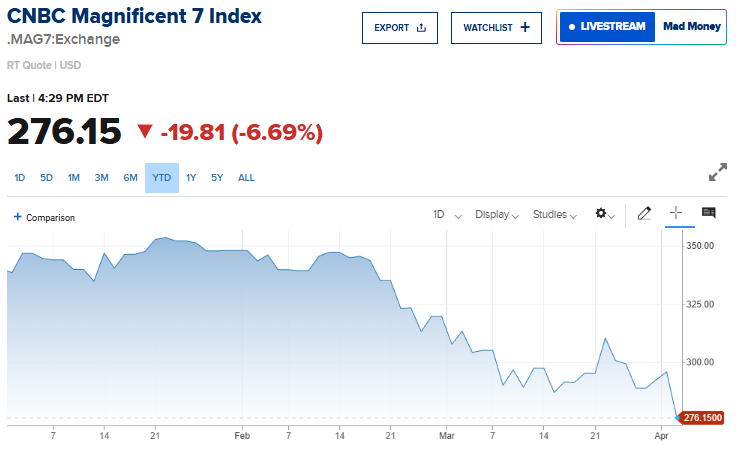The next great bubble, 4 favorite stocks right now, bitcoin sellers and more
Here’s part 3 of 3 from the transcript to this week’s Trading With Cody Interactive Live Conference Call.
Q: What is your favorite stock right now?
Cody: It depends on your time horizon and your risk reward. From a long term perspective, I think Amazon, the stock we discussed earlier. I would bet on Jeff Bezos and Amazon and the critical mass they’ve obtained on so many levels. So, Amazon would be my most obvious favorite right now. Let me look at some latest positions and make sure that I’m not not thinking of something. Let me make sure I’m thinking of everything.
You know, I don’t have a particular favorite stock right now and that’s part of the problem I’m having with sending out a new trade alert and giving you guys a new pick and/or buying more of an existing pick or something. My short-term dislike if the market setup but not being outright bearish has me cautious but not shorting aggressively. I’ll give you three stocks not-named Amazon that I do like right now. Amazon and these three stocks are also the only 8-rated stocks on the most recent Trading With Cody Latest Positions.
Impinj. As you guys know, I nibbled some recently when it was under $30 and now I think it hit $40 today. I’m not buying more right now, but I do like Impinj here. I liked it better at $30-32. But, as I’ve said all along, if this company does become the de facto standard for RFID it could go up tenfold in the next five years. If it doesn’t, it will probably go down 80% in the next two to three years. We have a defined risk reward profile there. If you’re willing to take it; take it. If you’re scared, or if you don’t like or know the management, or you don’t want to do it, then don’t take the risk on this name.
Palo Alto Networks. Have you guys heard about the Equifax hacking? I imagine you have. Everybody has seen the Equifax hacking news and have probably been affected by it. Palo Alto Networks. Cybersecurity. It’s growing in the industry. I think they’re the best.
And the third one, Intel. Intel is powering a lot of the Amazon stuff. Intel is widely hated. Intel has been left for dead. It’s cheap. Good balance sheet. Decent dividend. Risk reward profile on that one is very different from the risk reward profile on Impinj. Intel could be up fivefold in the next ten years. Maybe it could be a trillion dollar company someday. $150 billion market cap right now. Could be five fold or more in ten or fifteen years, if they do great on the Internet of Things and they figure out to become a de facto standard in IoT of some sort. It could be cut almost in half if it fails. So, you have a 40% downside to 500%+ upside. There’s your risk reward profile on Intel.
Q: Cody, do you get the sense that a lot of people who have invested in bitcoin, much like yourself years ago, are locking in profits now? If yes, where is that money going? Is it sitting on the sidelines? Are people using their bitcoin profits to buy “safer” assets like gold or silver? Could this be a bigger issue or opportunity if and when bitcoin has a true crash from this bubble?
Cody: I don’t get the sense that anyone is selling their bitcoins. I only know people who are buying bitcoins, now that you ask. George Gilder is a good example of someone who’s been bullish and a bitcoin advocate and very much ahead of that curve. For years, George Gilder was and he’s still very bullish on it. And I think most anyone who was bullish about bitcoin five years ago is still very bullish and thinks they’re a geniuses right now and is probably buying more bitcoins, betting more of their career on bitcoin or betting bigger oin whatever way they are betting on bitcoin. Early bitcoin advocates are doing victory laps and trying to convince people what geniuses they are and why bitcoin’’s supposed to still go higher and that you ain’t seen nothin’ yet.
So that’s another reason why I’m so bearish on bitcoin, if not calling a top on it at least. I just think the risk reward at this particular level at this particular time. I don’t know anyone but me who used to be bullish bitcoin years ago and who is actually bearish on bitcoin afresh. People who were bearish on bitcoin have hated bitcoin the whole time and continue to hate bitcoin. Those are the only people on the planet who are bearish on bitcoin.
If you’re new to bitcoin, you’re either throwing your hands up saying, “This is nonsense. What are these people doing?! There’s nothing backing this currency.” Or you’re going, “Holy cow, buy, buy, buy bitcoin! My friends are making money! I know a guy who says he turned $1500 into $15,000 trading etherium and bitcoins. I better get in, man. Ooh, look here, you can get in this ICO (Initial Coin Operation) right now!”
You tell me. Have you found anyone who has gone from bullish to bearish on bitcoin? Can you find anyone besides Cody Willard and the Trading With Cody subscribers who follow me, who owned bitcoin five years ago and sold it recently for thousands of dollars and more recently is starting to get outright bearish on it? Probably not. You get people all the time who say, “I told you it was a bubble too.” Well yeah, but did you tell me to buy it before it was in the bubble? Do you have any credibility?
We at Trading With Cody did get into bitcoin years ago, as you guys know. I told you we were getting in ahead of the bubble on all of this stuff. And we’re here now. I’m bearish on the bitcoin bubble and not bearish on the technology stock bubble yet.
Q: Cody, I’m very curious about the tax implications of the bitcoin. In your experience, are people reporting their capital gains properly?
Cody: I have no idea about that last part. I don’t ask people how they are reporting their capital gains if and when they sell bitcoin for profits. I would assume it’s like anything else. If you have a good accountant; he’s doing a good job on making sure you’re paying your capital gains taxes if you’re selling bitcoins or Google for profits. Whatever, if you’re selling Micron for profits you’re going to pay your capital gains if you have a good accountant and/or you’re trying to do the right thing and stay out of jail. And frankly, I assume the bitcoin gains I had from buying it and/or taking it as payment five or ten years ago at $100 is standard capital gains taxes but I don’t know that. It’s not my area of expertise, and it will be my accountant, the same one I’ve had for 20 years handle it. I don’t want it to be my area of expertise.
Q: Thanks Cody. I’m loving the app.
Cody: Well, thanks. I’m so excited. This is sort of cool, isn’t it?
Q: It’s fantastic. So, We’re still in the midst of a tech bubble. Where do you think the next bubble will be?
Cody: So now I’ve not only got to try to predict when this bubble ends but I’ve got to think about what will be the next bubble we head into? Got it. Great. Let’s set the bar high.
Seriously though, I think there are already a lot of asset bubbles out there right now. Another thing that’s on my radar, as a potential black swan negative catalysts for the markets and the economy, is those negative interest rates that you still have on German bonds and other developed countries’ bonds. Governments are issuing bonds that pay 99 cents on the dollar with outright negative rates. And that’s not normal. That’s not sustainable. The only reason something like that happens is because the government in those countries and/or around the world are forcing assets into these things. They do that with both with 0% or negative central bank interest rates which means that you can’t get any return on a savings account so you’ve got to invest that money somehow, somewhere. Combine that with tax-deffered investment accounts that require you to put your money at risk on equities or government bonds.
It’s just not normal. Why would anybody put money somewhere in which they get 99 cents back for the dollar they lent out unless there are unnatural incentives to do so?
That’s another existing bubble though, and it’s hard to get away from existing bubbles vs predicting new bubbles as there are already a lot of asset bubbles. Canadian real estate is probably a bubble right now.
So what’s the next great bubble about to come? The next bubble, speaking of irony, will be the crash of bubbles. There will be a bubble of bubble crashes. I think that is most likely the obvious next bubble, if not the most likely.
The most obvious next bubble would be all of these bubbles crashing, and then you have a bubble of bubble crashes, which is also known as a panic. Which is also known as a wonderful time to buy.
Q: Cody, I’ve been reading up on Micron. MU is the stock symbol. Cody, this brings up a question. How do you evaluate the importance/ truth / of the information that is delivered and digested…no one gets it right all the time, most just some of the time..and it all depends on being in the “right place / decision at the right time!” I went to an investor annual meeting for OLED ..15 -20 years ago ..never invested much back then and missed it on the current surge ! I would have been 15 years too early! So when you are making a decision for a new trade, can you share which sources you trust? Like you did with your hand surgeon buddy with AXGN, which has been a great source and a great investment.
Cody. He’s asking me what makes me trust those sources enough to risk my hard earned money on an investment like I did with my hand surgeon buddy at Johns Hopkins University who does double hand transplant surgeries when we discovered Axogen. Yeah. AXGN. That has been a great source and great investment according to this person asking this question. And yes, I agree. It’s up nearly 500% since we bought it. Micron is going to benefit from the car revolution, because of the demand for memory and DRAM. Specifically, the different memories that Micron makes. Short answer is that you should read everything you can about Micron but be sceptical about everything you read. Be cynical about everything. And then go look at the company’s balance sheet and read their quarterly conference call transcripts.
Fact is, Micron is a terrific example of the benefits for corporations and their shareholders when the Republican Democrat Regime allows oligilopical rollups. For many years Micron, Samsung, and all those other ones that were making those memory chips were slugging it out with really low margins and over time they’ve rolled each other up to the point they don’t have such bad margins because there’s not enough competition to drive the margins lower. So, they’re able to squeeze out extra margins and extra profits. And your phone is more expensive than it would be in a competitive component marketplace.
I don’t own Micron and I don’t want to own it. Mainly because I don’t like the management very much and I don’t like their balance sheet when I’ve looked at it in years past. Part of it is probably just a biasness on my part because for years it was just sort of a pig of a stock. Bill Fleckenstein used to call Micron “The pig that flies.” Of course he was calling it that at 50 cents a share back in 2002 and he still calls it that.
So, that goes to your question Norman of why and how hard it is to believe analysis. I like Bill. I know he’s well intentioned but he’s been bearish and wrong about most of the technology for the last twenty years. And if you read his stuff today he’s probably really bearish on Micron. And look, I can’t own all of them and I don’t own Micron. I think I did own it in the past when it was trading the single digits and I sold it for a slight gain. It’s a fine company. It’s not really one I’m about to buy though. It’s not on my buying radar anytime soon. Maybe if the stock had another crashing or for some cyclical reason it got destroyed and was back in single digits, it might be time to look at it at that point. But at the current levels, no.
Q: Congratulations on the new app. Do you have a Snapchat position? I don’t think I see it on your listing of your current positions and maybe I’ve missed it. I know you had it for a while.
Cody: I do not own snapchat. I think I have some worthless call options left, but those original call options I threw at that thing are probably down 99%.
Q. What are you latest thoughts on Snap?
Cody: I’d rather own it than sell it at 14. But, as you guys now, I haven’t bought into the Evan Spiegel thing yet. I’ve been surprised at how successful Facebook and Instagram have been in competing with Snapchat, especially Instagram. Snapchat is struggling globally. Domestically, it’s a killer, but you have to be a billion user company to compete with Facebook. Snapchat needs to grow 6 or 7 times larger than it currently is. And therein lies your opportunity as an investor. If they do grow 6 or 7 times and become a billion user network, the company will be worth a hundred billion or more. I’d rather own Snap than short it.
Ok guys. Thank you. That’s an hour. That was fun. Give me a million hearts and stars of love before you hop off on the app and I’ll see you back on here next week. Go tell a friend about Trading With Cody. Peace, love and happiness.




